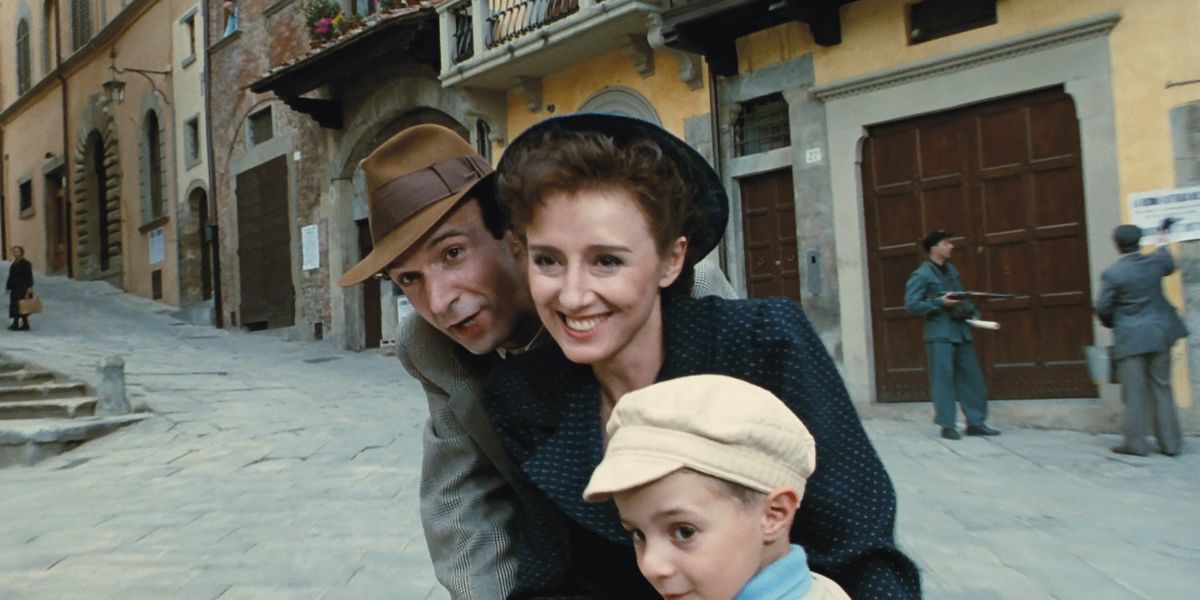Roberto Benigni, in front of and behind the cameras, signs the Italian tragicomedy that won 3 Oscars.
Roberto Benigni gets into the lion’s den. Literally, from the moment in which the protagonist of ‘Life is beautiful’ is an honest Italian bookseller interned in a German concentration camp in the company of his wife and his son. metaphorically, because only a comedian in the state of grace bestowed by maturity is capable of extracting a smile from tragedy.
Successfully overcoming this first obstacle, the theme of the film is not original, but some of the precedents are illustrious. Jerry Lewis shot a similar argument but the resulting film, ‘The Day the Clown Cried’, has never seen the light of day as a result of a lawsuit with the producer. In this way, Benigni connects directly with Chaplin who, after sharing the leading role in ‘The Kid’ with little Jackie Coogan, dared to caricature Hitler himself in ‘The Great Dictator’.
‘Life is beautiful’ does not pursue such ambitious goals but the challenge it sets itself is not minor. The first part of the film corresponds to the illusions of the young man who aspires to find work and marry the woman he loves. In the second, on the other hand, the drama explodes and the caricature acquires poetic consistency. Initially, we only see the comedian with his face uncovered; later, we know that the laughter that lights up his face is just a mask under which the tears slide.
By making child’s play out of a Nazi concentration camp, Benigni approaches reality with the same nature of appearance that is characteristic of cinema. But at the same time, makes this sensitive fairy tale an effective denunciation of the holocaust. The end of ‘Life is beautiful’, as happy as circumstances allow, leaves an unmistakable bittersweet taste. Not surprisingly, Fellini said, regarding the character that Benigni played in La voz de la Luna, that no actor could speak as seriously about death as only a clown could.
DATA SHEET
Address: Robert Benigni Distribution: Roberto Benigni, Nicoletta Braschi, Giorgio Cantarini, Marisa Paredes, Horst Buchholz Original title: life is beautiful Country: Italy Year: 1997 Gender: Drama Screenplay: Roberto Benigni, Vincenzo Cerami Duration: 108min
Synopsis: Guido (Roberto Benigni) is an Italian Jew who dreams of owning his own bookstore. For this reason, he travels to the city of Arezzo, in the Italian Tuscany and where her uncle lives, to settle there. Guido meets the school teacher Dora (Nicoletta Braschi) and falls madly in love with her. From that moment he devises all kinds of stratagems, full of humor, to win her over. Dora is going to marry a fascist in the city but when their engagement is announced, Guido runs away with her. The couple has a child, Josué (Giorgio Cantarini), and they live happily until Nazism comes to town and the family is deported. to a concentration camp. Guido will make up that they are in a quirky resort, full of eccentric amusements so that his son is not aware of the horror of the camp. His stay involves a game, according to Guido. In it, the Nazis are ¿the super bad guys who scream incessantly¿ and they, the players with the best chance of winning points and winning. Guido’s imagination, good humor and courage will keep his family alive until the war is over.
Source: Fotogramas
Camila Luna is a writer at Gossipify, where she covers the latest movies and television series. With a passion for all things entertainment, Camila brings her unique perspective to her writing and offers readers an inside look at the industry. Camila is a graduate from the University of California, Los Angeles (UCLA) with a degree in English and is also a avid movie watcher.

